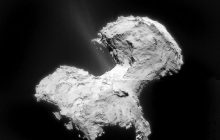
Asteroids, not comets, may have delivered most of Earth's water to the planet when the solar system was young, new data from a probe orbiting a comet suggests.
Comets are some of the solar system's most primitive building blocks, with many dating to soon after its formation. Scientists think that these dirty snowballs probably helped seed Earth with key ingredients for life, such as organic compounds.
The European Space Agency's (ESA) Rosetta spacecraft is helping scientists learn more about the role these icy nomads have played in the evolution of the solar system and life on Earth by analyzing the composition of Comet 67P/Churyumov–Gerasimenko. In August, Rosetta became the first spacecraft to orbit a comet, and in November, its Philae lander became the first probe to make a soft touchdown on a comet's surface. Rosetta is also the first mission to escort a comet as it travels around the sun

 2928
2928
 36
36

 46
46
 2
2

 46
46
 1
1